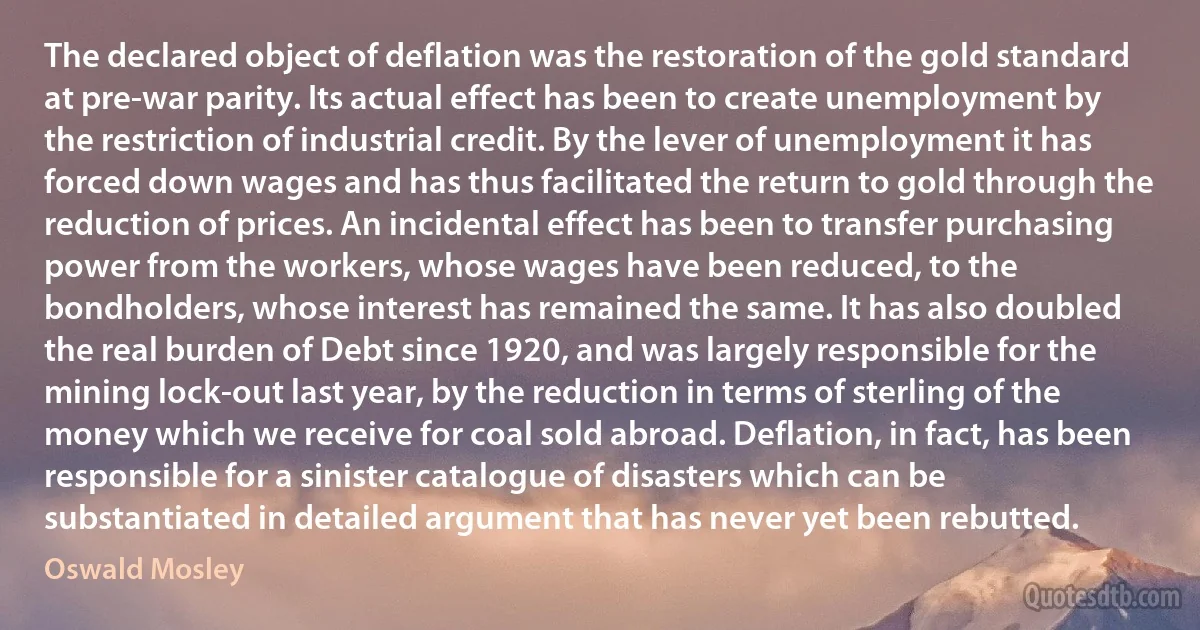
The declared object of deflation was the restoration of the gold standard at pre-war parity. Its actual effect has been to create unemployment by the restriction of industrial credit. By the lever of unemployment it has forced down wages and has thus facilitated the return to gold through the reduction of prices. An incidental effect has been to transfer purchasing power from the workers, whose wages have been reduced, to the bondholders, whose interest has remained the same. It has also doubled the real burden of Debt since 1920, and was largely responsible for the mining lock-out last year, by the reduction in terms of sterling of the money which we receive for coal sold abroad. Deflation, in fact, has been responsible for a sinister catalogue of disasters which can be substantiated in detailed argument that has never yet been rebutted.
Oswald MosleyRelated topics
abroad argument burden catalogue credit debt gold industrial interest last mining money parity power purchasing real receive reduction restoration restriction return sold sterling thus transfer wages year yet incidental deflationRelated quotes
While conditions in the United States because of the World War are serious, they are so much better than in the years following the close of the Civil War, that we who have had the double experience can be greatly encouraged. Then one-half of our country was devastated, its industries destroyed or paralyzed; now we are united and stronger in every way. Then we had a paper currency and a dangerous inflation, now we are on a gold standard and with an excellent banking and credit system. The development of our resources and wonderful inventions and discoveries since the Civil War place us in the foremost position to enter upon world commerce when all other nations have come as they must to co-operation and co-ordination upon lines for the preservation of peace and the promotion of international prosperity.

Chauncey Depew
After having thus successively taken each member of the community in its powerful grasp and fashioned him at will, the government then extends its arm over the whole community. It covers the surface of society with a network of small, complicated rules, minute and uniform, through which the most original minds and the most energetic characters cannot penetrate, to rise above the crowd. The will of man is not shattered, but softened, bent, and guided; men are seldom forced by it to act, but they are constantly restrained from acting. Such a power does not destroy, but it prevents existence: it does not tyrannize, but it compresses, enervates, extinguishes, and stupefies a people, till each nation is reduced to nothing better than a flock of timid and industrious animals, of which the government is the shepherd.

Alexis de Tocqueville
Japan had come to terms with Russia because of her difficulties, but this did not mean approval of communism. Communism meant the end of emperor-worship, and feudalism and the exploitation of the masses by the ruling class, and indeed almost everything that the existing order stood for... But communism is the outcome of widespread misery due to social conditions, and unless these conditions are improved, mere repression can be no remedy. There is a terrible misery in Japan at present. The peasantry, as in China and India, are crushed under a tremendous burden of debt. Taxation, especially because of heavy military expenditure and war needs, is very heavy. Reports come of starving peasants trying to live on grass and roots, and of selling even their children. The middle classes are also in a bad way owing to unemployment and suicides have increased.

Jawaharlal Nehru
I have already accepted the policy of Imperial preference...to the effect that a preference will be given on existing duties and on any duties which may subsequently be imposed. On this subject I think there is no difference of opinion between us. ... I am prepared to say that the key industries on which the life of the nation depends must be preserved. I am prepared to say also that, in order to keep up the present standard of production and develop it to the utmost extent possible, it is necessary that security should be give against the unfair competition to which our industries have been in the past subjected by the dumping of goods below the actual cost of production. ... I shall look at every problem simply from the point of view of what is the best method of securing the objects at which we are aiming without any regard to theoretical opinions about Free Trade or Tariff Reform.

David Lloyd George
Marylin Marsh, who had about it with Spain, declared to him [the old Spanish man] [...] But it redounds to your national credit, the then Missus Turner went on in effect - she'd been reading up on reciprocal atrocities in the Guerra Civil - that the sunny Spanish could never be guilty of an Auschwitz, for example. In the first place, your ovens would have died, like our kitchen stove, instead of your Jews, whom you'd got rid of anyhow in the sunny Fifteenth century, no? And in the second place the whole idea of extermination camps would've been too impersonal for your exquisite Moorish tastes. Much more agradable to push folks off a cliff one at a time into a gorgeous Mediterranean sunset, as you did near Malaga - three hundred, was it, or three thousand? Or to rape and then kill a convent-full of nuns in the manner of the saint of their choice - was that Barcelona or Valencia?

John Barth
